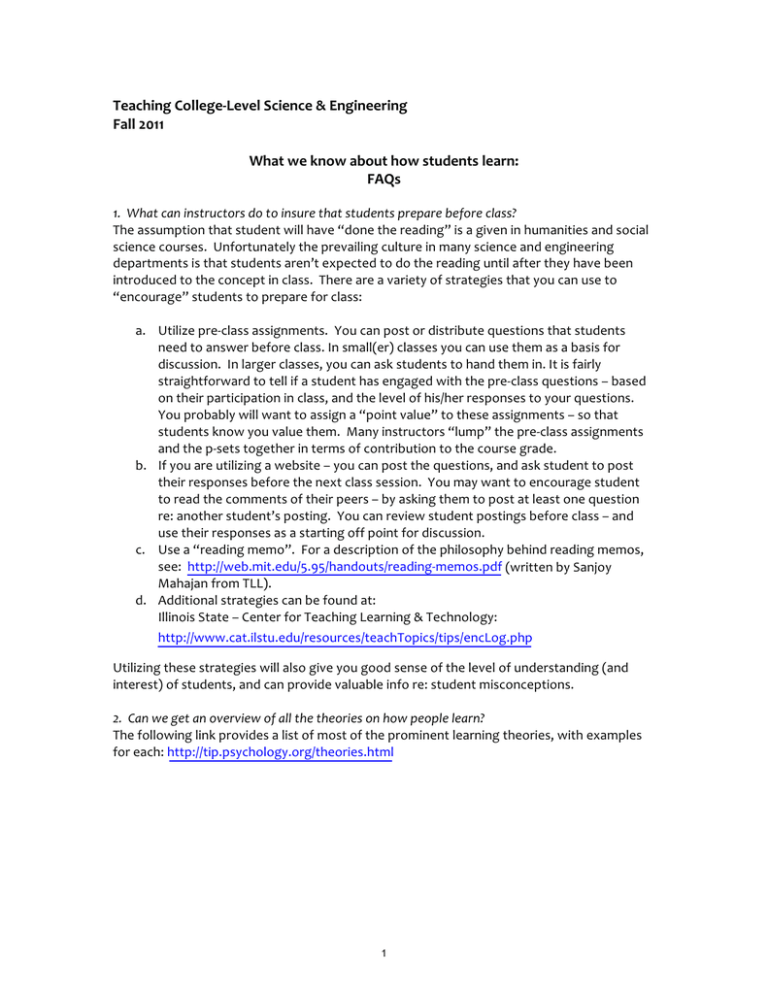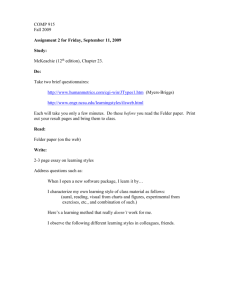Document 13492770
advertisement

Teaching College-Level Science & Engineering Fall 2011 What we know about how students learn: FAQs 1. What can instructors do to insure that students prepare before class? The assumption that student will have Idone the reading" is a given in humanities and social science courses. Unfortunately the prevailing culture in many science and engineering departments is that students aren't expected to do the reading until after they have been introduced to the concept in class. There are a variety of strategies that you can use to Iencourage" students to prepare for class: a. Utilize pre-class assignments. You can post or distribute questions that students need to answer before class. In small(er) classes you can use them as a basis for discussion. In larger classes, you can ask students to hand them in. It is fairly straightforward to tell if a student has engaged with the pre-class questions - based on their participation in class, and the level of his/her responses to your questions. You probably will want to assign a Ipoint value" to these assignments - so that students know you value them. Many instructors Ilump" the pre-class assignments and the p-sets together in terms of contribution to the course grade. b. If you are utilizing a website - you can post the questions, and ask student to post their responses before the next class session. You may want to encourage student to read the comments of their peers - by asking them to post at least one question re: another student's posting. You can review student postings before class - and use their responses as a starting off point for discussion. c. Use a Ireading memo". For a description of the philosophy behind reading memos, see: http://web.mit.edu/S.9S/handouts/reading-memos.pdf (written by Sanjoy Mahajan from TLL). d. Additional strategies can be found at: Illinois State - Center for Teaching Learning & Technology: http://www.cat.ilstu.edu/resources/teachTopics/tips/encLog.php Utilizing these strategies will also give you good sense of the level of understanding (and interest) of students, and can provide valuable info re: student misconceptions. 2. Can we get an overview of all the theories on how people learn? The following link provides a list of most of the prominent learning theories, with examples for each: http://tip.psychology.org/theories.html 1 3. What are some techniques/strategies to help promote student learning/How can instructors put cognitive theories into practice)? As mentioned in during the session: To help students develop framework & context • Understand what students already know (and what their misconceptions are) and help them add new knowledge to existing framework. o Pre-tests o MUD cards o Pre-class, post-reading assignments (see the response to Q1 above) • Support Imeaning making"/knowledge construction o Cue students: give students the opportunity to formulate a response and help them at specific points when they get stuck, i.e. guide them through their answers. o Vary the conditions under which learning takes place. This could be as Itraditional" as presenting the same concept in lecture and in lab. Students are generally introduced to a concept in lecture, but then the concept is reinforced when students have to apply it during the lab. In an Iequation heavy class" ask students to formulate an answer without using equations. E.g. IConstruct a physical/verbal argument for why the Entropy Maximum and Energy Minimum Principles are equivalent." (You could also ask students to construct a mathematical argument for the same statement.) o Require student to vote/publicly commit to a answer before providing the solution. This will increase students interesting and motivation to understand the solution. • Provide opportunities for practice (practice retrieval) o Set up situations wherein students have to explain to other students (Pose questions during class, and have students formulate answers in pairs, or groups) o Pose Iopen-ended" problems, wherein students must determine what additional info they need to solve the problem (a la the broken hammer example from the session). o Pose questions - targeted at specific, building (and testing) a student's understanding of particular concepts and ideas o Give students the chance to apply what the have learned to new situations. Ask them to identify examples of a particular concept. (see the comment on the synergy of lab and classroom experiences For additional strategies, see: See the paper entitled: IImplications of cognitive studies for teaching physics", Edward Redish, Am. J. Phys., 62(9) 1994, posted under: Materials -> Class 2 -> Redish. For an excellent, practical article on improving learning in large lecture classes, see, 1 The Interactive Lecture: Reconciling Group and Active Learning Strategies with Traditional Instructional Formats", James L. Cooper, Pamela Robinson, and David A. Ball, posted under: Materials -> Class 6 -> Interactive Lecture. 2 33 Carleton College - Teaching Geoscience http://serc.carleton.edu/introgeo/interactive/whatis.html 4. I'd like more information on learning styles. Learning styles is a somewhat controversial topic. It is almost always a gross simplification, and a disservice to the learner to take any individual and identify him/her with a single learning style (at the potential exclusion of all others). Recent articles in Psychological Science in the Public Interest (ILearning Styles: Concepts and Evidence") and the Chronicle of Higher Education (IMatching Teaching Style to Learning Style May Not Help Students") provides argue that there is no strong scientific evidence to support the idea that teaching styles should Imatch" learning styles". Pdfs of these articles are included Materials -> Class 2 For completeness, however, information on learning styles is provided in the following links: Richard Felber and Barbara A. Soloman (NC State) : http://www4.ncsu.edu/unity/lockers/users/f/felder/public/ILSdir/styles.htm From Indiana University of Pennsylvania, College of Education - Kolb's Learning Styles http://www.coe.iup.edu/rjl/instruction/cm1S0/selfinterpretation/kolb.htm 5. How do I motivate students to be interested in the class/course? The following web links provide some useful information and tips on motivating students in your class: Vanderbilt Center for Teaching: http://www.vanderbilt.edu/cft/resources/teaching resources/interactions/motivating.htm Tools for Teaching, Barbara Gross-Davis: http://honolulu.hawaii.edu/intranet/committees/FacDevCom/guidebk/teachtip/motiv.htm Dealing with Student Background Deficiencies and Low Student Motivation Richard M. Felder and Rebecca Brent http://www4.ncsu.edu/unity/lockers/users/f/felder/public/Columns/FAQs-4.html Chem. Engr. Education, 35(4), 266-267 (2001) 6. How do we gather information on every students" prior knowledge and apply it to the rest of the semester so no one is Ileft behind"? (This response was written by Dr. Lori Breslow - TLL's Director) This is really two questions. First, let me give you several suggestions for determining students" prior knowledge. Instructors in science and engineering often use a pre-test, which does not count in the student's grade, to determine how much their students already know. In courses that rely on essays or other written work, instructors may ask students to write something that, again, does not figure in their grade. In my course, we ask students to write a Ibaseline" selfassessment memo in which they reflect on their own abilities in writing, speaking, and interpersonal communication, as well as identify what they want to improve upon during the 3 semester. The second question�how to teach a class with a wide disparity of skills or knowledge�is, in my opinion, the hardest question to answer for instructors who teach technical subjects. My best advice is the instructor should teach to the middle: that is, to the student with an average background who understands most of the material with an average level of effort. However, the instructor should also try to find ways to engage students who are better prepared or more knowledgeable, and provide additional help for weaker students. Some instructors give the better prepared students extra hard problems or additional research projects. (MIT students are often happy to do these�) Less prepared students can be helped during office hours or extra tutorials. Most universities also have services (e.g., writing centers) that can help students with weaker skills. 4 MIT OpenCourseWare http://ocw.mit.edu 5.95J / 6.982J / 7.59J / 8.395J / 18.094J / 1.95J / 2.978J Teaching College-Level Science and Engineering Fall 2012 For information about citing these materials or our Terms of Use, visit: http://ocw.mit.edu/terms.
